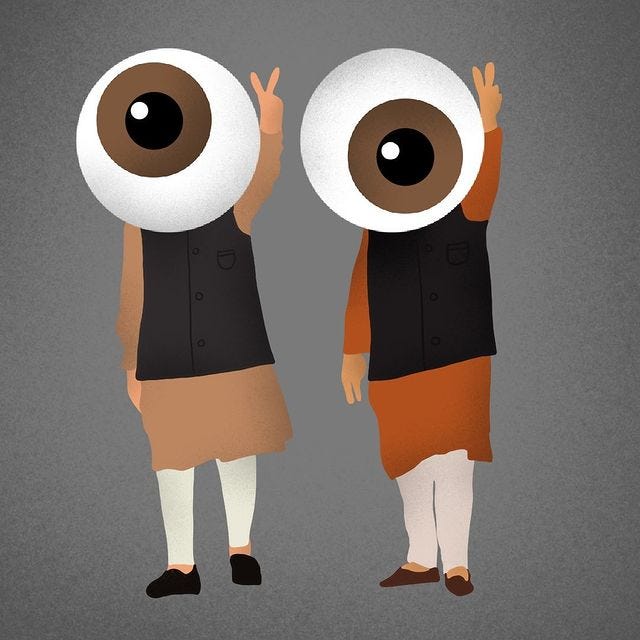‘What is this Pegasus—another new variant of the virus?'
What you need to know about the latest spyware scandal, how it affects you, and why you cannot afford to sleep on it.
“What is this Pegasus—another new variant of the virus?” I was asked rather nonchalantly yesterday. While this question might make you chuckle, it points to a larger phenomenon at play in our lives today. As news of the spyware reportedly placed on the phones of politicians, activists and journalists “broke the internet” a mere 48 hours ago, the tweets, posts and reels have already moved on to the ultimate media zeitgeist of our times—memes. Our increasingly short attention spans, the onslaught of daily global tragedies (social, economic, planetary and political), has exhausted our outrage. Fatigue, exasperation, humor and a shrug are all we seem to afford as a response. The dangers of this are more sinister than we care to admit. This draining of our empathy has begun to foster an indifference, chipped at our critical thinking abilities, and constantly shapes our collective memory, or the lack thereof.
While Rana Ayyub’s devices get examined by forensics, Forbidden Stories and Amnesty International, this article urges you to equip yourself with knowledge from sources that have relentlessly worked on this project and continue to create awareness and push for legal frameworks to keep up with our growing dependence on the internet. This newsletter today is not meant to alarm but to inform so you can better understand the silent violations of our right to privacy in the largest democracy of the world. From the brand of toothpaste you switch to or stick to, to the government you vote in or out, your behaviors and tendencies are easily mappable data points ready to be exploited for business or to shift histories of nations.
Nobody is immune to propaganda, and weaponizing of our digital footprints spans agendas of all scales of consequence. We have all, at some point, witnessed the creepiness of targeted advertisements. Our phones have tried to sell us holidays, real estate, furniture, socks, soap or gadgets after we’ve had conversations about these subjects. We have expressed our indignation and discomfort, then moved on to click “Agree,” “Accept Cookies” or “Sign in with Facebook,” because it is simply that convenient. Rather, the alternative looks cumbersome and unnecessary. When the idea of daily data hygiene is made to seem complicated, the repercussions downplayed and our consent never sought, Pegasus becomes yet another unfathomable piece of news about “internet, data something, security, spying, Israel something.”
“If you have nothing to hide, you have nothing to fear”
A familiar argument used by the surveillor and surveillee alike. Surveillance, put simply, is the observation or monitoring of a person. There is intent and deliberation behind this scrutiny of actions, speech and behaviors. The insidious, permanent and highly intrusive nature of surveillance today has a profound impact on our psyches and our justification of what constitutes ethics, and how these definitions change with the people subjected to judgment. So far we know a list of activists, politicians, and journalists have been targeted by the Pegasus spyware, which is sold exclusively to governments. This list of names and their associations with the opposition and general dissent for the policies and workings of the Modi government, tend to lure one into the notion that “This doesn’t concern me; I am nobody, not important enough to be spied upon.” But it is imperative to pause here and remember the perils of propaganda, and how it functions and infiltrates the lives of “nobodies,” to serve a larger scheme .
The most effective propaganda does not even try to feed you brand new information or change your mind. Instead, it uses what you already know and believe, what you already feel and think (think of yourself as data points of internet behavior), and feeds you links to make connections to form a premeditated agenda; the entire time making you believe you are doing it all on your own. Well-constructed propaganda is careful not to insult your intelligence; it makes you believe in yourself as a rational thinking adult, while feeding you manipulated, exaggerated and oversimplified information in the language you understand and respond to emotionally.
An overexposure to death—in terms of mortality and morality—has eaten into our capacity to be shocked, and has expanded our tolerance for atrocities. As the current regime downplays the extent of this scandal, we must muster a resilience to their denial and understand that the stakes for Indian democracy are extremely high. Today, the Indian democracy rests on the shaky pillars of dissent and questioning, a curiosity from each of us that is also our fundamental right. A healthy amount of skepticism is essential and a survival skill in this era when facts, information and manipulative lies coexist with impunity and equal reach on the internet. But, can you imagine a state with all its institutions so compromised that its citizens have nowhere to go for accountability and accuracy? What happens when citizens of a nation lose all trust in its systems—legal, judicial, political, electoral, social, educational, economic—and the country clubbed with typically autocratic regimes? Let’s not find out.
Further Readings:


